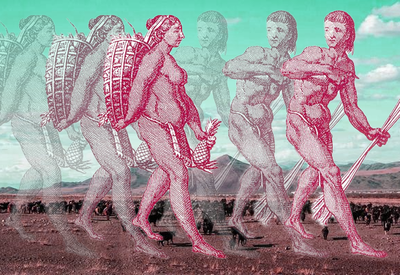The human condition has always been underpinned by aggressive individualism, usually dormant and constrained by civilisation. Marry that to digital technology, argues Carlo Bordoni, and we reawaken our inner Neanderthal – a violence that emerges in the very online phenomenon of passive aggression. This work is based on Carlo’s new book Ethical Violence published by Polity Press UK.
This piece was originally published in "7", Il Corriere della Sera, 12 January 2024 and was translated by Margherita Volpato.
From physical abuse to verbal abuse and passive aggression, we are constantly surrounded by violence. Violence has always been integral to human evolution, as though inscribed in our DNA, and we depend on it to defend ourselves, overpower others, and to ensure our survival. Perhaps violence is best viewed as a mark of human incompleteness and imperfection. Nietzsche defined man as “the still undetermined animal”, one whose perfection is still in the distant future. The online phenomenon of passive aggression, of seething keyboard warriors using principled opposition to veil their inner violent drives, cast today’s humans as little more than technologized Neanderthals, or pithecanthropus technologicus.
___
Aside from its ethical necessity, repressing aggression has always been a civilizing task
___
We have, at least in part, attempted to contain human violence through civilisation. We can see this most clearly in Norbert Elias’s writings in The Civilising Process, which focused not only on exploring the topic of aggression but every aspect of civilized relations, including what makes proper table manners. And education is equally formative as it is repressive. In Jean-Jacques Rousseau’s Emile — a seminal text of the Enlightenment, an age in which rationality was called upon to ensure social stability as well as law and order — it is through education that a good citizen is formed. Aside from its ethical necessity, repressing aggression has always been a civilizing task. It is a task that has been further complicated by technology.
Violence and aggression are always ready to re-emerge, especially under contemporary norms of individualism. It is undeniably true that individualism has its positive traits: after all, progress is achieved through one’s separation with the community, in which the individual is lost in the totality of others. Human narratives are marked by this constant need for separation, to achieve greater personal autonomy and individualisation from others. Therefore, individualism could be seen as a step forward towards emancipation, if it weren’t, at the same time, accompanied by a revival of ancient instincts that go directly against it. It is in this painful contradiction that lies the drama of our contemporary existence, split between the need to evolve and the desire to reconnect with an unresolved past.
 SUGGESTED READING
The myth of man the hunter
By Kimberly Hamlin
SUGGESTED READING
The myth of man the hunter
By Kimberly Hamlin
Just as the sociologist Émile Durkheim warned, when social structures unravel and anomie prevails, we not only run the risk of regressing but of dismantling the very structures of society. Without rules, our spontaneous characteristics would take over, those traits that are, yes, instinctual but also uneducated. In this way, aggression and violence resurface in groups where there was once harmony, creating potential enemies and dangerous competitors out of previous co-inhabitants.
___
The Renaissance introduced the individual as the centre of the world, before scientific advances demonstrated the limits of man in comparison to the infiniteness of the universe.
___





















Join the conversation